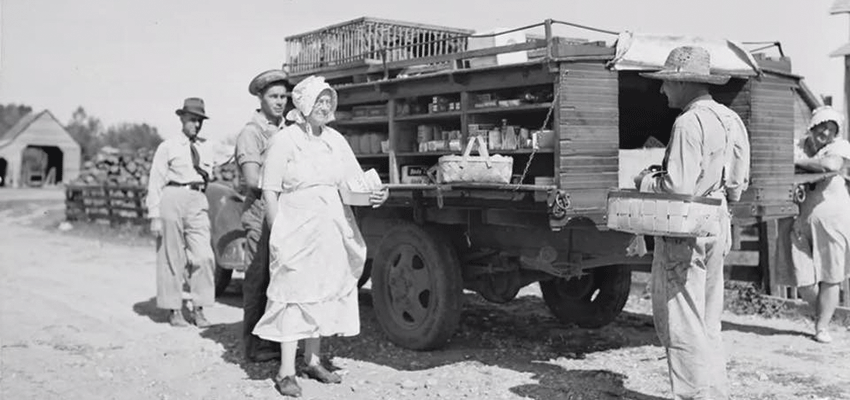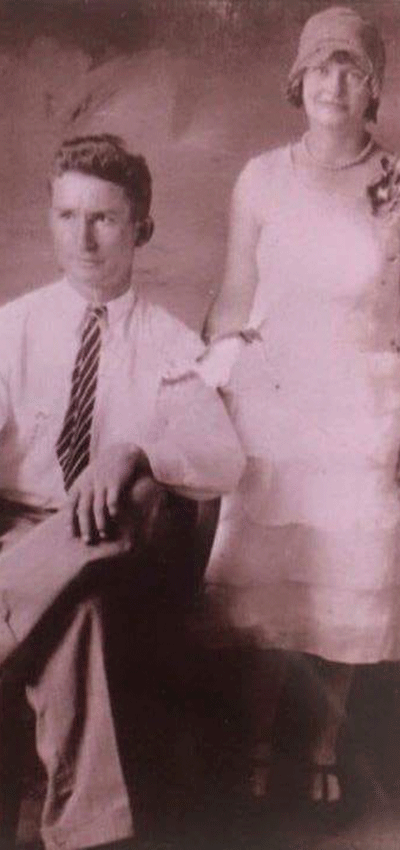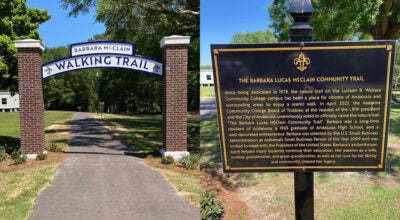Remember When: Goodnight sweetheart, till we meet tomorrow
Published 3:16 pm Friday, July 5, 2019

- Photo of an Old rolling store. Courtesy Photo
A popular British song was a hit of the air waves in 1931, “Goodnight Sweetheart, till we meet tomorrow.” Radio was where the hits were played and the listeners were many as families gathered around the radio for news and entertainment. For the most part the younger generation today does not even realize that television was not around in those Great Depression years of the 1930s and into the 1940s.
A call went out recently on my social media page for a wedding picture taken of local couples during the 1930s. An interesting story came in with the picture that is featured in today’s column, thanks to Jim Lawrence of Montgomery, formerly of Opp.
Also, a picture was sent in of a typical Rolling Store in those Depression days. Thanks to one of our readers Ed Williams, a former newspaper editor and retired journalism professor at Auburn University.
Jim’s dad, Layman R. Lawrence, was born in 1907 in Florala, but at age 16, the family moved to Coffee County to live and farm with his mother’s brother, Bill Wright. His mother, Nora Rushing Lawrence was born in 1905 about 8 miles above Elba in the Zoar Community. They met near Ino east of Opp and married near there on June 28, 1931.
They tenant-farmed for the first 15 years, but later moved to Covington County. They were basically farmers without many possessions other than their clothing and a few pots and pans, maybe what they called a chiffarobe and a wood stove. They moved from place to place from 1931 to 1946 until they last tenant-farmed in the Friendship Community north of Opp. By that time in 1946, they scraped together enough money to buy 100 acres with three buildings in the Horn Hill Community for a sum of about $3,000. which was a lot back then. They gave a note each year on the place with the Campbell-Utsey folks in Andalusia to get seed and fertilizer to make a crop. That routine went on for many years.
Dad had only a 4th grade education and mother went part of the way through the 7th grade. They had 7 children, 4 boys and 3 girls, all born at home except the youngest, Tony who was born in 1950 at Mizell Hospital in Opp. The delivery charge was $50. So we have always called him the “50-dollar baby!” One girl Sara died at age 11 with heart trouble a few months before the last child came along.
Our parents attended ice cream socials, quiltings, and other similar events but not often since transportation was very limited in the Depression era.
The first vehicle they had was a 1949 Chevrolet, then a 1954 Chevy later on. Prior to that, they drove an “Owensboro” wagon drawn by two mules. When they moved from Friendship to the place they bought at Horn Hill in 1946, all family belongings were moved in 12 different wagon trips, each of which took most of a day at that slow pace. The family still owns that wagon.
During the 1946 move from the Friendship Community to Horn Hill, on the last trip, the folk harnessed their one milk cow and hitched her to the back of the “Owensboro” wagon and made her walk all the way. She was so tired that she wouldn’t give milk for 2 or 3 days afterwards!
Mr. Lawrence used mules to farm until the mid 1950s when he acquired a small 8-N Ford Tractor, then later a 2856 Ford 600 Tractor from Cotton Tractor Co. Both were 2-row, nothing at all like the big tractors used today. The family still owns that 1956 Ford Tractor and they use it occasionally to mow small areas.
When the children in the family got sick, their mother used some herbal medicines, but when the Rolling Stores came around, she traded eggs for her favorite remedy, the dreaded “Castor Oil” which was considered a cure-all for every illness including ear aches to belly aches!
From the Lt. Col. James D. Lawrence (USAF Ret.) book “Airman’s Odyssey,” Jim writes, “When not picking cotton, gathering peanuts, stripping cane, pulling corn, or hauling hay and other chores, we children were looking for entertainment. We were always daydreaming about how to avoid the grueling work. We played cowboys and Indians, rode bikes and homemade carts, played baseball or football in a cow pasture, and basketball at a goal with no net nailed to the side of a barn. We used bricks and sometimes even cow patties for bases and home plate.”
“When fights broke out, the favorite weapon was a corn cob. We fished in the nearby Lightwood Knot Creek, broke ponies that had never been ridden, and sometimes camped out sleeping on the ground using a tree root for a pillow. We often hunted squirrels in the farm’s wooded areas and sometimes hunted dove in and around the peanut or corn fields. We tried all sorts of other things to occupy time not spent on the farm.”
The oldest son Harry served in the Army from 1950-53 stationed in Nyack, New York and overseas in the Asia-Pacific Theatre (Formosa). Jim was in the Air Force for more than 26 years flying all over the world in different military and civilian aircraft visiting more than 40 countries and islands and touching base in 37 of the 50 states. He became an accountant after college at Troy State College and later an officer, pilot, and educator in the USAF. Brother Edmon became an accountant. Sister Hettie worked in the Federal Civil Service for 35 years at Eglin Air Force Base, Florida. Sister Syble married a financier and banker who had attended both Straughn and Opp City Schools. Tony got his college degree from the University of Alabama in Physics, became an innovating petroleum engineer, and established his own consulting business, TDL International which he still operates in Jakarta, Indonesia.
The surviving siblings still own the family farm coming up on nearly 74 years since their parents settled there. They enjoy family gatherings at the farm where they reminisce about the good old days enjoying the fruits of their parents’ labor and wisdom but at the same time are thankful for the modern conveniences.
It is apparent that the Lawrence children have done well most likely, they state, because their mom and dad knew so well the hardships from not having an education. They remember hearing the discussions growing up about the importance of an education, the key to success, and took it to heart as a way to make their way through life.
“Yes,” Jim Lawrence states, “the personal stories of trials, tribulations, hardships, and eventual triumph are the best of all!”
In Lawrence’s book, he concludes his story of his incredible journey in the Air Force by saying, “It was a great privilege to work with the very best soldiers, sailors, and airmen this country has to offer – all things I had never dreamed of and a long way from humble beginnings on an Alabama farm.”
I Remember When Jim Lawrence, Opp High School graduate in the Class of 1965, presented a program to the Covington Historical Society. He has made significant contributions to honoring veterans in this area by sharing their stories of bravery and sacrifice living the creed of duty, honor, and country. He has also stressed that a parent’s lack of education should not be an impediment to a child’s aspirations and ability to achieve and contribute to the defense of this great country! As a member of the newly organized Covington Veterans Foundation, I salute Jim Lawrence, Covington County native.
Sue Bass Wilson, AHS Class of 1965, is a local real estate broker and long-time member of the Covington Historical Society. She can be reached at suebwilson47@gmail.com.



